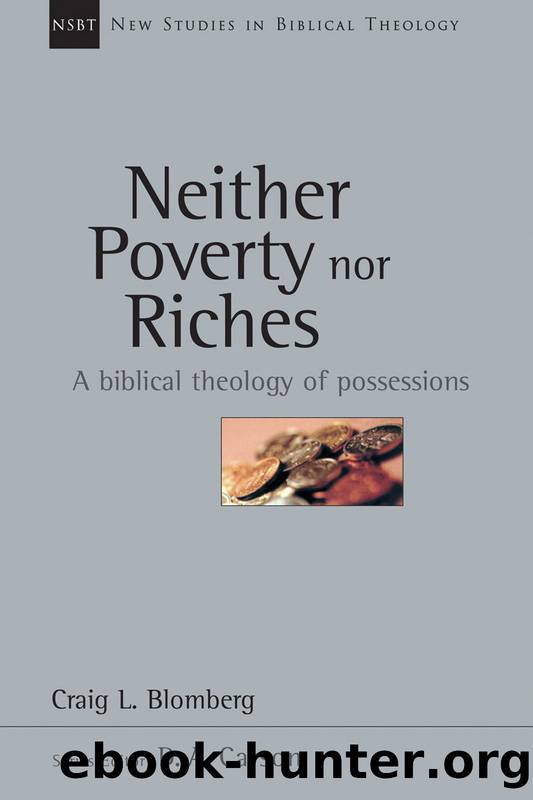Neither Poverty nor Riches by Craig L. Blomberg

Author:Craig L. Blomberg
Language: eng
Format: epub
Tags: possessions;materialism;materialistic;greed;selfish;money;wealthy;wealth;poor;poverty;ethics;economics;power;rich;stewardship;giving;generous;New Studies in Biblical Theology;NSBT;Biblical theology;theology;Bible;Scripture;Christian;Christian theolog
Publisher: InterVarsity Press
Published: 2018-11-15T00:00:00+00:00
Galatians
Although many still date Galatians after the Apostolic Council of Acts 15, and therefore usually after 1 and 2 Thessalonians, conservative commentators have put forward well-founded arguments for correlating the visit to Jerusalem described in Galatians 2:1-10 with Acts 11:27-30 (cf., e.g., Longenecker 1990: 61; Bruce 1982: 126). This makes it probable that Galatians 2:11-14 corresponds to Acts 15:1 and that Galatians was written in haste as Paul had just heard of a Judaizing faction plaguing Galatia similar to that at Antioch, while he was preparing to head for Jerusalem. If the Apostolic Council took place in 48 or 49, then Galatians should probably be dated to these same years.3 It is thus significant that Paul in probably his earliest letter, as he was still fashioning his relationship with the original apostles in Jerusalem, notes that all easily agreed âthat we should continue to remember the poor, the very thing I was eager to doâ (Gal. 2:10). While theology and territory for ministry were still being hashed out, no debate centred around the need to help the poor.4 If this passage is correlated with Acts 11:27-30, then clearly it refers to the famine Agabus predicted in Judea, to which reference has already been made (see above, p. 171). And it reminds us that a key concern of early Jewish Christianity, as we saw in our survey of James and the first part of Acts, was also a point that Paul eagerly endorsed. Indeed, it seems that he would spend the better part of the coming decade organizing a large collection of funds from throughout the Greco-Roman cities he evangelized to be sent back to Jerusalem.5
The other reference in Galatians to what believers should do with their money appears in 6:6. Many commentators have seen this verse as an isolated command in a loose series of miscellaneous closing exhortations: âThose who receive instruction in the word must share all good things with their instructor.â Even so, C. K. Barrett (1985: 82) is almost certainly right in observing that this âmay be the earliest reference to any kind of paid Christian ministryâ. Paul hints at what will become more explicit and detailed in 1 Corinthians 9, namely, full-time Christian ministersâ right to earn their living by the gospel. This command sets Paul off from conventional Judaism, in which rabbis were expected to have a trade to practise so that they did not have to rely on financial support from others for their ministry. It agrees with Greco-Roman wisdom, but Paul will later stress the numerous situations in which he finds it important to forgo his rights. Nevertheless, far from being an isolated exhortation, Galatians 6:6 probably forms one significant application of the broader principle of verses 1-5 of believers bearing one anotherâs burdens. Similarly, while verses 7-10 generalize about people reaping as they sow and encourage Christians to âdo good to all people, especially to those who belong to the family of believersâ (6:10), it is probable that Paul is thinking primarily
Download
This site does not store any files on its server. We only index and link to content provided by other sites. Please contact the content providers to delete copyright contents if any and email us, we'll remove relevant links or contents immediately.
The Lost Art of Listening by Michael P. Nichols(7506)
Why I Am Not A Calvinist by Dr. Peter S. Ruckman(4153)
The Rosicrucians by Christopher McIntosh(3520)
Wicca: a guide for the solitary practitioner by Scott Cunningham(3179)
Signature in the Cell: DNA and the Evidence for Intelligent Design by Stephen C. Meyer(3138)
Real Sex by Lauren F. Winner(3023)
The Holy Spirit by Billy Graham(2952)
To Light a Sacred Flame by Silver RavenWolf(2823)
The End of Faith by Sam Harris(2742)
The Gnostic Gospels by Pagels Elaine(2531)
Waking Up by Sam Harris(2461)
Nine Parts of Desire by Geraldine Brooks(2369)
Jesus by Paul Johnson(2362)
Devil, The by Almond Philip C(2332)
The God delusion by Richard Dawkins(2309)
Heavens on Earth by Michael Shermer(2284)
Kundalini by Gopi Krishna(2185)
Chosen by God by R. C. Sproul(2164)
The Nature of Consciousness by Rupert Spira(2108)
